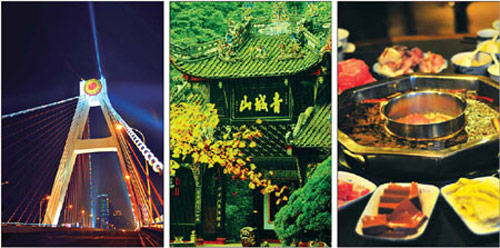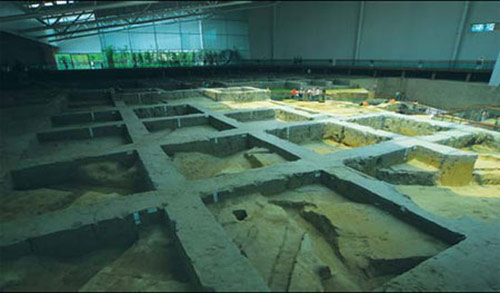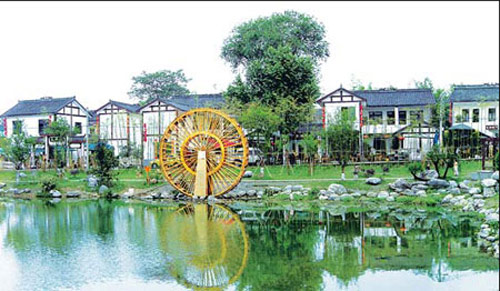UN: Sustainable tourism in vibrant Chengdu
Updated: 2012-10-15 09:35
By Li Fusheng (China Daily)
|
|||||||||||
 |
|
Left to right: Night view of the Tianfu Bridge in Chengdu, the provincial capital. Gateway to the Qingcheng Mountains, birthplace of Taoism. Renowned Sichuan hotpot is one of the city's signature dishes. |
 |
|
The 5-square-kilometer Jinsha site in the city's western suburbs has been hailed as one of the major archeological discoveries in China. |
 |
|
The nation's giant panda breeding research center is home to about 70 of the highly endangered species, which number fewer than 2,000 worldwide. |
 |
|
Scenic rural areas add to the allure of Chengdu. |

Home of the giant panda, ancient wonders and renowned cuisine, Li Fusheng reports.
The UN World Tourism Organization unveiled an agency to observe tourism development on Oct 12 in Chengdu, the capital city of Southwest China's Sichuan province, as part of its Global Observatory on Sustainable Tourism program.
The Chengdu observatory, the organization's fifth in China, will collect data for scientific studies on sustainable tourism development by monitoring local tourism and environmental protection as well as social, cultural and economic developments.
The UNWTO also plans to hold a summit on world sustainable tourism development in Chengdu early next year.
The moves are expected to help enhance the city's reputation as major tourism city in China, said local tourism officials.
Chengdu has abundant tourism attractions including the nation's giant panda breeding research center.
Ten kilometers from downtown Chengdu, the center is home to about 70 of the highly endangered species, which number fewer than 2,000 worldwide. About 75 percent are found in Sichuan.
The facility has been created to resemble the natural habitat of the giant panda, with large open spaces for them to roam free and providing the best venue to see the iconic animals up close.
The center also breeds other endangered species such as the red panda and the black-necked crane.
Places of interest
While the panda center tends to attract kids and animal lovers, what impresses many other visitors to Chengdu is the ancient Dujiangyan irrigation system.
Built in 256 BC by local official Li Bing to tame frequent flooding of the Minjiang River, it is probably the oldest functioning water-control project in the world.
The Dujiangyan system, which has stood for nearly 2,300 years, silently diverts water to irrigate nearly 70,000 hectares of farmland that produce almost a third of the province's grain. It survived the disastrous Wenchuan Earthquake almost unscathed in 2008.
Together with Chengdu's Qingcheng Mountains, the Dujiangyan irrigation system was included on the list of UNESCO world heritage sites in 2000.
Offering unique attractions on its 36 peaks, the Qingcheng Mountains have long been recognized as the birthplace of Taoism, China's ancient indigenous religion.
Chengdu is also home to 3,000-year-old remains of the Jinsha settlement, which is widely believed to have been the capital of the ancient Shu state.
Located in the city's western suburbs, the 5-square-kilometer Jinsha site has been hailed as one of the major archeological discoveries in China in the 21st century, according to local historians.
About 50 kilometers from the famed Sanxingdui remains in Sichuan province, Jinsha rose to prominence around 1000 BC and shares similar origins with Sanxingdui, as can be seen from similar burial objects, historians said, although Jinsha had no city wall.
More than 800 tombs have been excavated in the Jinsha ruins dating from the middle of the Western Zhou Dynasty (c. 11th century - 771 BC) to the early Spring and Autumn Period (770 - 476 BC). Artifacts made from ivory, jade, bronze, gold and stone have been found at the site.
Delicious cuisine
In addition to places of historical and natural interest, Sichuan's noted cuisine is a big part of the city's charm.
As the provincial capital, Chengdu is an obvious choice to try out authentic Sichuan cooking, one of eight major regional cuisines in China.
With a range spanning some 6,000 dishes, Sichuan cuisine features bold flavors, particularly spiciness from liberal use of garlic and chili peppers as well as the unique flavor of the Sichuan pepper.
One dish recommended by almost all is Sichuan hotpot.
As the metal pot starts to simmer, typical ingredients including thinly sliced meat, leafy vegetables, mushrooms, and seafood are added. The result is usually eaten with a dipping sauce.
Visitors to Chengdu can enjoy the dish at countless hotpot restaurants operating throughout the city.
Another signature dish of Sichuan cuisine is mapo tofu - soft bean curd served up with a fiery meat sauce.
In addition, Zongfu Road, Chunxi Road and Jinli Street are places to taste delicious local snacks in Chengdu.
Due to the sophistication of its cooking, UNESCO declared Chengdu to be a city of gastronomy in 2010, the first in Asia.
Local bar streets, including Jinli Street and Lan Kwai Fong, offer the chance to sample authentic nightlife.
Visitors can talk or play mahjong at local teahouses to help immerse themselves in the city's famous pastimes.
Intangible culture heritage
Chengdu is also renowned across China for its intangible cultural heritage.
With 17 items listed as national heritage - including Shu embroidery and Chengdu lacquer painting - Chengdu is the designated host city of the biennial International Intangible Cultural Heritage Festival, a cultural gala co-sponsored by UNESCO and the Chinese government.
Not only a tourist destination, Chengdu is also an ideal starting point to tour other cities in southwestern China, said local tourism officials.
"Go southward and you can visit the Emei Mountain and the Leshan Giant Buddha, go northward you can visit Jiuzhaigou, and go westward you can reach Tibet," one official said.
It is also convenient for visitors to begin their travels outside China from Chengdu, he added.
As the country's fourth largest airport hub, Chengdu has flights to 49 countries and regions worldwide.
It is also home to consulates from nine countries including the United States, Germany, France, Singapore and Sri Lanka, making it more convenient for local people to get visas.
Contact the writer at lifusheng@chinadaily.com.cn
 |
|
The vast ancient Dujiangyan irrigation system was included on the list of UNESCO world heritage sites in 2000. Photos Provided to China Daily |
Related Stories
Where locals go: Chengdu 2012-09-29 10:03
Travel back in time at Tang poet cottage 2012-07-17 13:30
Big Love: Can you spare some change? 2012-07-06 11:15
Models shine at final of New Silk Road Model Contest 2012-06-21 14:16
Festival focuses on microfilm 2012-06-19 14:44
Chengdu wins praise for puppetry and shadow play 2012-06-06 10:39
Today's Top News
Rescuers race against time for quake victims
Telecom workers restore links
Coal mine blast kills 18 in Jilin
Intl scholarship puts China on the map
More bird flu patients discharged
Gold loses sheen, but still a safe bet
US 'turns blind eye to human rights'
Telecom workers restore links
Hot Topics
Lunar probe , China growth forecasts, Emission rules get tougher, China seen through 'colored lens', International board,
Editor's Picks

|

|

|

|

|

|





